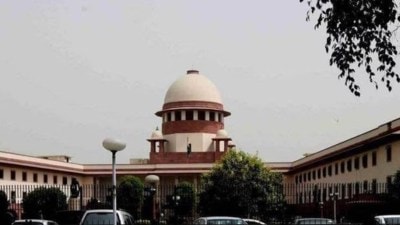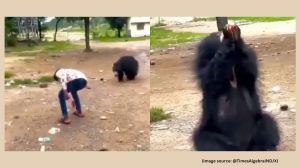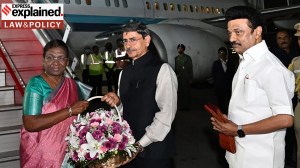ICJ orders Israel to halt military assault in Rafah: The case and the ruling
The new order has come in regard to a fresh request made by South Africa on May 10. The country approached ICJ, asking for an urgent order to protect the Palestinians in Gaza from “grave and irreparable violation of their rights”, owing to Israel’s ongoing military assault on Rafah.
 Judges of the International Court of Justice (ICJ), during a ruling on South Africa's request to order a halt to Israel's Rafah offensive in Gaza as part of a larger case brought before the Hague-based court by South Africa accusing Israel of genocide, in The Hague, Netherlands May 24, 2024. REUTERS/Johanna Geron
Judges of the International Court of Justice (ICJ), during a ruling on South Africa's request to order a halt to Israel's Rafah offensive in Gaza as part of a larger case brought before the Hague-based court by South Africa accusing Israel of genocide, in The Hague, Netherlands May 24, 2024. REUTERS/Johanna GeronThe International Court of Justice (ICJ) at The Hague, Netherlands, on May 24 ordered Israel to halt its military assault in the city of Rafah, located in the southernmost part of Gaza. The 15-judge Bench, however, stopped short of ordering a full ceasefire throughout the enclave.
In its ruling, the court also directed Israel to open the Rafah crossing between Egypt and Gaza to allow the flow of humanitarian aid. It asked the Jewish state to provide access for any fact-finding or investigative missions sent by the UN to investigate the genocide allegations in Gaza. Israel was ordered to report back on its progress to the ICJ within a month.
Rulings by ICJ are legally binding but it has no way of enforcing them. However, experts believe the latest order can deepen Israel’s isolation from the rest of the world.
What was the case?
The ruling is the latest pronouncement by the court in a case brought by South Africa against Israel in December 2023, accusing the latter of a genocide in the Gaza Strip.
Since the case has begun, the court has given a series of rulings. For instance, in January, it ordered Israel to take action to prevent acts of genocide against Palestinians. Two months later, the ICJ ruled that Israel must ensure that basic food supplies arrive without delay to Palestinians in Gaza.
The new order has come in regard to a fresh request made by South Africa on May 10. The country approached ICJ, asking for an urgent order to protect the Palestinians in Gaza from “grave and irreparable violation of their rights”, owing to Israel’s ongoing military assault on Rafah.
“The situation brought about by the Israeli assault on Rafah, and the extreme risk it poses to humanitarian supplies and basic services into Gaza, to the survival of the Palestinian medical system, and to the very survival of Palestinians in Gaza as a group, is not only an escalation of the prevailing situation, but gives rise to new facts that are causing irreparable harm to the rights of the Palestinian people in Gaza,” South Africa’s application to the ICJ reads.
The country accused Israel of conducting a “brutal military attack on the sole remaining refuge” of the Palestinian people in Gaza, who were simultaneously being subjected to a “humanitarian aid blockage”. South Africa called for an urgent ceasefire “for the sake of humanity” and “to prevent further violations of the Genocide Convention”.
What did the ICJ rule?
The ICJ, in a 13:2 majority, ruled that Israel must “immediately halt its military offensive and any other action in the Rafah Governorate that may inflict on the Palestinian group in Gaza conditions of life that could bring about its physical destruction in whole or in part.” The two dissenting votes came from Uganda and Israel.
The court also reaffirmed the provisional measures indicated in its January 26 (mentioned above) and March 28 orders and said these should be immediately and effectively implemented. The March 28 order said that Israel, “in conformity with its obligations under the Convention on the Prevention and Punishment of the Crime of Genocide” and in view of the worsening conditions faced by Palestinians in Gaza”, particularly, the spread of famine and starvation, must take all necessary and effective action to ensure basic food supplies arrive without delay to the Palestinians in Gaza.
Highlighting that the military ground offensive in Rafah, initiated by Israel on May 7, was still ongoing, the ICJ pointed out that nearly 800,000 people have been displaced from Rafah as of May 18, just 11 days after it began.
The ICJ ruling this year also said that since the developments in the region were exceptionally grave and constituted “a change in the situation within the meaning of Article 76 of the Rules of Court,” the earlier provisional measures indicated in the March 28 order did not “fully address the consequences arising from the change in the situation, thus justifying the modification of these measures.”
Article 76 of the Rules of Court says that the ICJ, at the request of a party or on its own, may, at any time before the final judgement, revoke or modify any decision concerning provisional measures if, in its opinion, “some change in the situation” justifies such revocation or modification.
Finally, the court also said that based on the information before it, the immense risks associated with the military offensive in Rafah “have started to materialize and will intensify even further if the operation continues.”
The ICJ also said that it wasn’t convinced that the “evacuation efforts and related measures that Israel affirms to have undertaken to enhance the security of civilians in the Gaza Strip, and in particular those recently displaced from the Rafah Governorate, are sufficient to alleviate the immense risk to which the Palestinian population”.
Photos




- 01
- 02
- 03
- 04
- 05


































